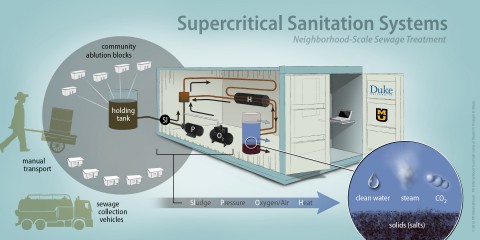Neighborhood-scale treatment of fecal sludge by supercritical water oxidation (SCWO) - Various documents on results from research grant
Deshusses, M. (2013)

Published in: 2013
Publisher:
Duke University, Durham, North Carolina, USA
Author:
Deshusses, M.
Uploaded by:
SuSanA secretariat
Partner profile:
common upload
9340 Views
247 Downloads
Location of library entry
Content - Summary
This library entry contains background documents for a grant that Marc Deshusses is leading (project manager Kathy Jooss) and which is funded by the Bill and Melinda Gates Foundation.
Further information and a discussion is available on the SuSanA discussion forum, see link below.
Short description of the project:
Engineers at Duke University and the University of Missouri are designing a unit that addresses the treatment of human waste and possible reuse of the system’s byproducts. It will sanitize the collected waste of approximately 1200 people — a neighborhood-scale solution.
The technology being employed, supercritical water oxidation (SCWO), is promising because it works quickly and generates energy in the forms of hot water and steam from the treatment of human waste. It does not require prior dewatering or drying of fecal sludge, and it effectively eliminates all types of harmful organisms. SCWO technology has already been implemented in several research and commercial applications to treat waste products including polychlorinated biphenyls (PCBs), chemical weapons and sewage sludge.
Goal(s):
Duke University and the University of Missouri seek to demonstrate that both SCWO and supercritical water gasification (SCWG), a related technology, have prominent roles to play in solving the world’s sanitation challenges.
Objectives:
The objective of this project is to produce a demonstration unit that fits into a 20 ft. shipping container and will be ready for testing in a developing country by summer 2014. A successful design will cost less than 5 cents per person per day at commercial volumes (capital and O&M costs together). In addition, we will produce a business model plan that quantifies and optimizes the economic, environmental and social benefits of the unit.
Partners: University of Missouri
Start and end date: April 4, 2013 – June 30, 2014
+++++++++++
Documents available for download below:
1 - Sanitation in South Africa: A Preliminary Evaluation of Barriers & Opportunities - Preliminary evaluation of the technical and economical feasibility to apply Supercritical Water Oxidation (SCWO) as a means to manage waste in the South African context (Jay S. Golden, Duke University, August 2013)
2 - Presentation on the Omni Processor for fecal waste at the FSM3 Conference in Hanoi, January 2015
Bibliographic information
Deshusses, M. (2013). Neighborhood-scale treatment of fecal sludge by supercritical water oxidation (SCWO) - Various documents on results from research grant. Duke University, Durham, North Carolina, USA
Filter tags
East Asia & Pacific English Fundamental research and engineering North America Sub-Saharan Africa














